Top 17 Surfer Alternatives & Competitors in 2024

Surfer has carved out a unique position among SEO content tools by delivering practical optimization guidance to content teams and marketing departments. The software analyzes keyword patterns, evaluates content structure, and examines top-performing competitor pages to generate specific recommendations. Many marketing teams rely on these insights to refine their content and boost organic search visibility.
What makes Surfer particularly effective is its commitment to data-backed content strategies rather than guesswork. The platform helps marketing teams develop content that resonates with target audiences while meeting search engine requirements. Growing numbers of marketing departments have found Surfer’s straightforward approach helps cut through the complexity of SEO optimization. The tool’s clean, intuitive design makes advanced content optimization accessible to team members at all technical skill levels.
While Surfer is a great product, it’s always good to shop around and look for alternatives. This article identifies some top competitors and their pros and cons.
Semrush
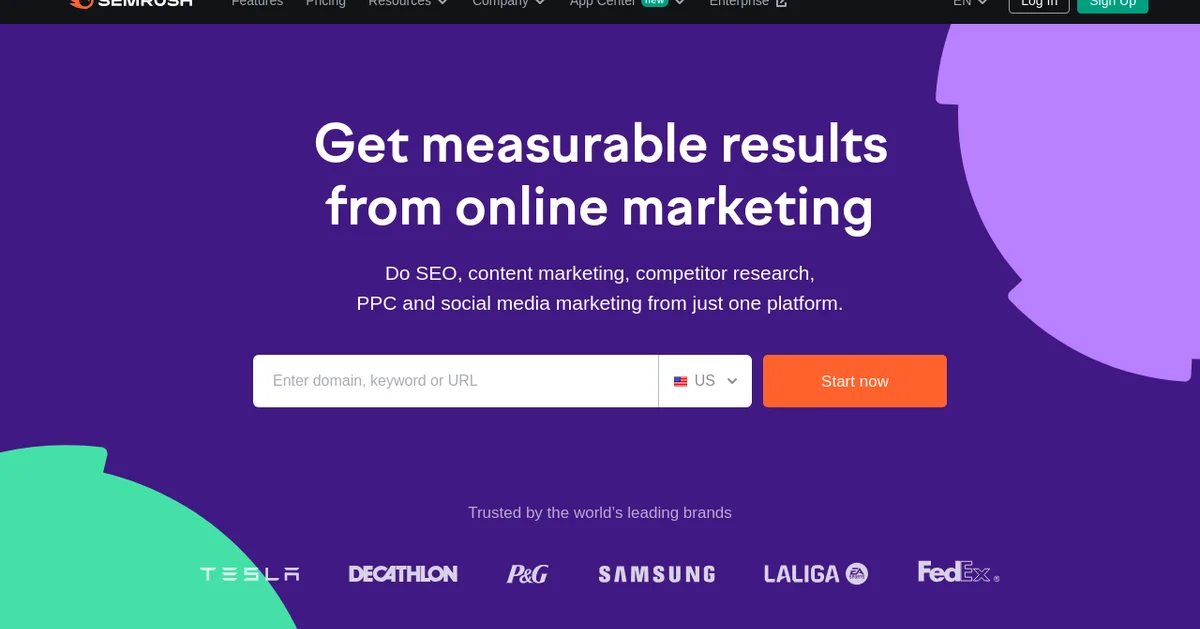
Semrush has earned its reputation as a powerhouse in B2B SEO content optimization. The platform combines essential digital marketing tools into a unified dashboard, making it valuable for organizations ranging from startups to enterprise-level companies. Rather than juggling multiple platforms, teams can manage their SEO, content strategy, market research, paid campaigns, and social media efforts in one place.
The platform’s keyword and competitive research capabilities pack serious analytical muscle, tracking keyword performance across 26 billion terms in 130 countries. Marketing teams leverage these insights to spot gaps in their strategy, analyze competitor movements, and identify promising market segments. The tools reveal everything from traffic trends to backlink profiles, giving teams actionable data for both organic and paid campaigns.
The technical SEO audit function runs over 130 distinct checks on website performance and optimization. This depth helps development and marketing teams quickly spot and fix issues affecting their rankings. Beyond technical aspects, Semrush provides smart content optimization suggestions powered by machine learning. The straightforward interface makes these advanced capabilities accessible to marketing professionals at any experience level.
Marketing agencies particularly benefit from Semrush’s workflow and reporting features. The platform streamlines client communications and project tracking, helping teams demonstrate ROI while maintaining efficient operations.
Pros
- Full-featured marketing toolkit in a single platform
- Rich competitive intelligence from vast keyword database
- Clean, approachable interface with smart optimization tips
- Thorough technical site auditing capabilities
- Built-in agency management and reporting tools
Cons
- Feature set can feel daunting at first
- Premium pricing may stretch small business budgets
- Mastering advanced features requires time investment
Clearscope
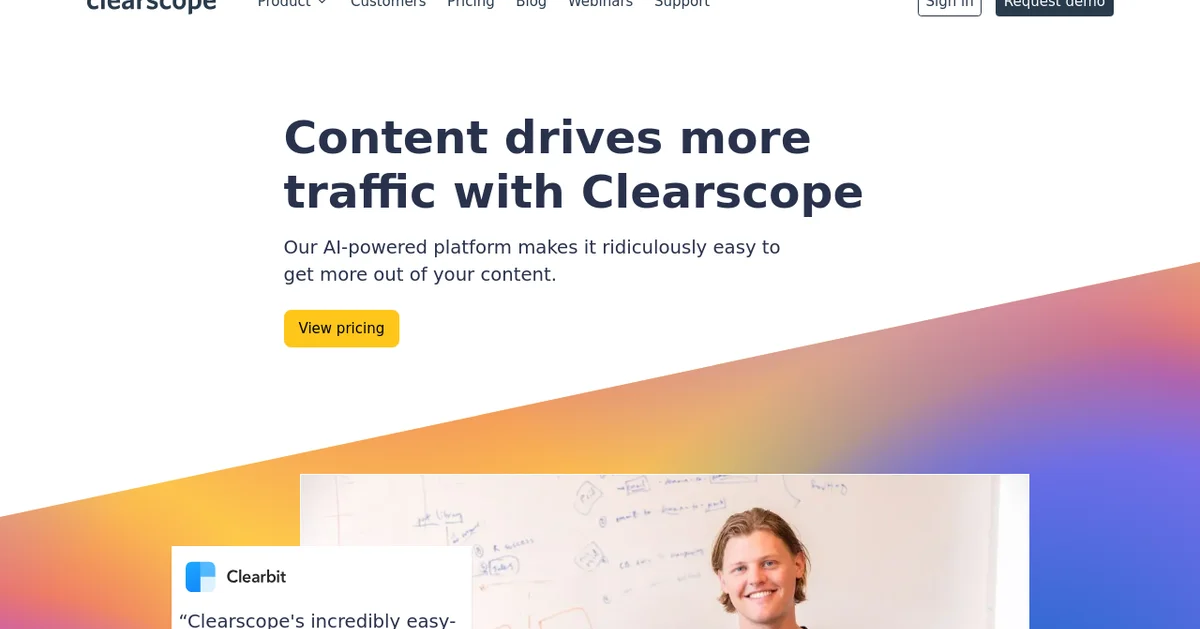
Clearscope has carved out its own space in SEO content optimization by keeping things straightforward and results-focused. Many teams gravitate toward its no-nonsense approach and clean interface. The platform works right inside Google Docs and Microsoft Word, making it simple to fold into existing workflows without disrupting established processes or requiring major changes to how content teams operate.
The platform’s AI engine provides smart, actionable suggestions during content development. Writers can spot and fill content gaps they might otherwise miss, leading to more comprehensive pieces that perform better in search results. Regular training sessions and responsive customer service create a supported environment where teams can get help when needed.
Real-world results speak volumes about Clearscope’s effectiveness. Client success stories demonstrate substantial traffic gains, with some organizations reporting organic traffic growth exceeding 2,000% over twelve months. These numbers reflect the practical value of implementing Clearscope’s recommendations.
Clearscope emerges as a compelling option compared to Surfer SEO through its blend of practical features, smooth workflow integration, and dedicated support resources. These elements combine to create a platform that delivers measurable improvements in content performance.
Pros
- Seamless integration with common writing platforms
- Smart content optimization suggestions
- Comprehensive customer support system
- Documented success in traffic growth
Cons
- Limited advanced functionality compared to Surfer
- Cost structure may challenge smaller organizations
- Learning curve for new platform adopters
MarketMuse
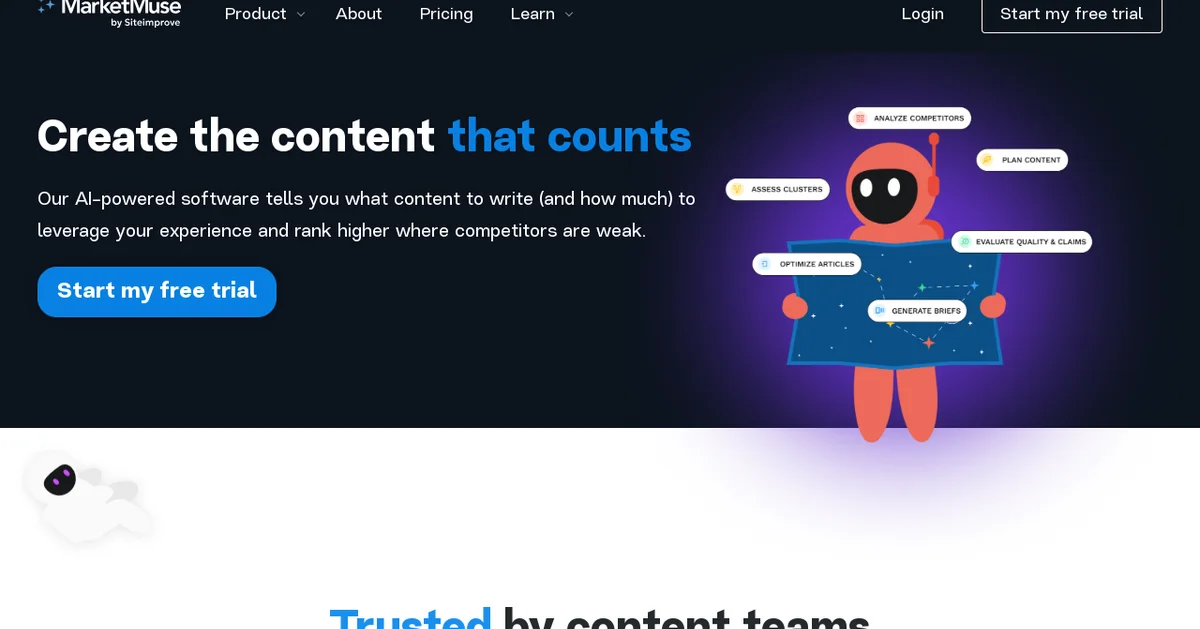
MarketMuse offers a sophisticated approach to content optimization that goes beyond traditional SEO tools. The platform dives deep into existing content libraries, using advanced AI to map out topic clusters and content gaps. By analyzing both your material and competitor content, it reveals opportunities to create substantial, meaningful content that serves reader needs while improving search visibility.
The platform excels at determining the right depth and scope for new content pieces. Rather than getting caught up in basic keyword metrics, MarketMuse evaluates topical coverage and pushes content teams toward genuine subject matter expertise. The built-in linking suggestions create natural content connections, helping readers navigate smoothly between related pieces. This comprehensive methodology sets it apart from tools that focus primarily on keyword placement.
MarketMuse emerged from a clear market need. Traditional keyword research tools weren’t delivering the depth modern content teams required. The platform evolved to support the full content development cycle - from initial research through optimization of existing assets. Teams using MarketMuse can build out authoritative content libraries that demonstrate real industry leadership.
MarketMuse delivers solid value for content teams seeking data-driven direction for their strategy.
Pros
- Deep content inventory analysis powered by AI
- Strategic topic cluster identification
- Clear guidance for content creation and updates
- Focus on demonstrating subject expertise
- Smart internal linking recommendations
Cons
- Initial platform navigation takes time
- Premium pricing structure
- Limited real-time keyword monitoring features
Frase
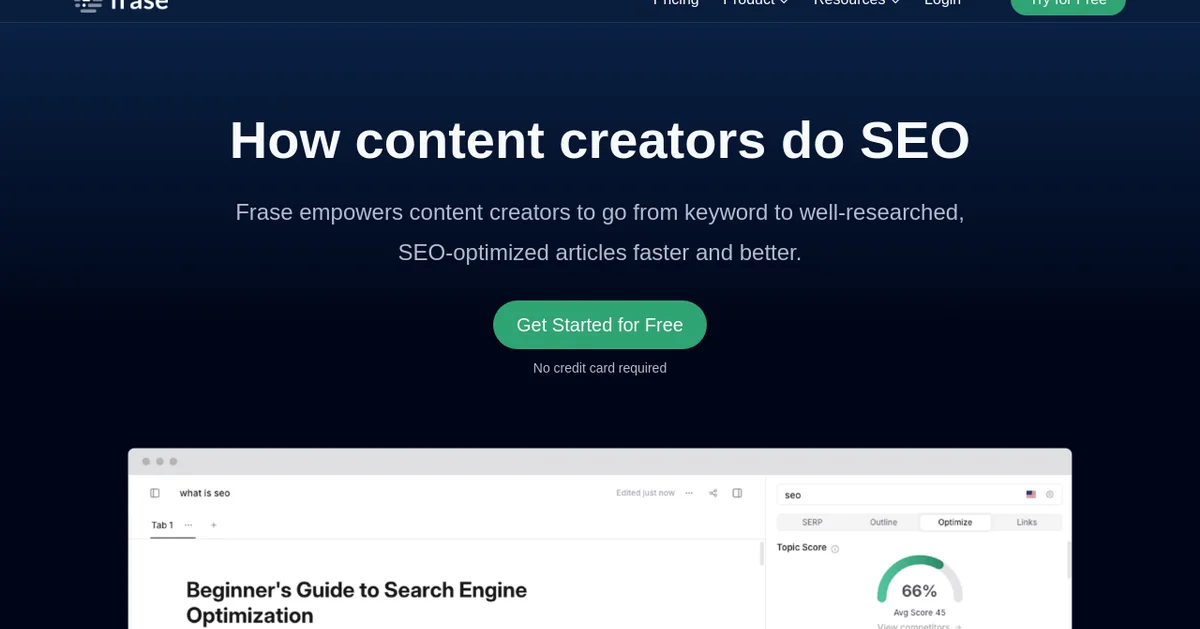
Frase stands out among SEO content tools by streamlining the entire process from research to publishing. The platform excels at changing complex search data into clear, practical insights through AI-powered analysis. Content teams often struggle with endless SERP analysis - Frase tackles this head-on by condensing top-ranking content into digestible takeaways that save hours of manual research.
The content brief generator delivers practical value for content teams. By pulling relevant headings directly from SERP results, the Outline Builder helps construct data-backed content structures in minutes rather than hours. The tool maintains a careful balance between optimization and readability throughout the process.
Teams and freelancers benefit from Frase’s collaborative workspace design. The platform includes practical features for task management, progress tracking, and template creation that keep projects moving smoothly. Having everything centralized helps maintain momentum during complex content projects while reducing back-and-forth between team members.
Frase targets content creators who need deeper research capabilities beyond basic keyword tools. The topic modeling system provides nuanced guidance on keyword usage and content structure, helping teams create material that connects with readers while satisfying search engine requirements.
Pros
- AI research tools cut research time significantly
- Rapid content brief creation
- Straightforward outline development
- Built-in team collaboration tools
- Flexible template system
Cons
- Initial platform navigation takes time
- Limited features beyond content optimization
Yoast
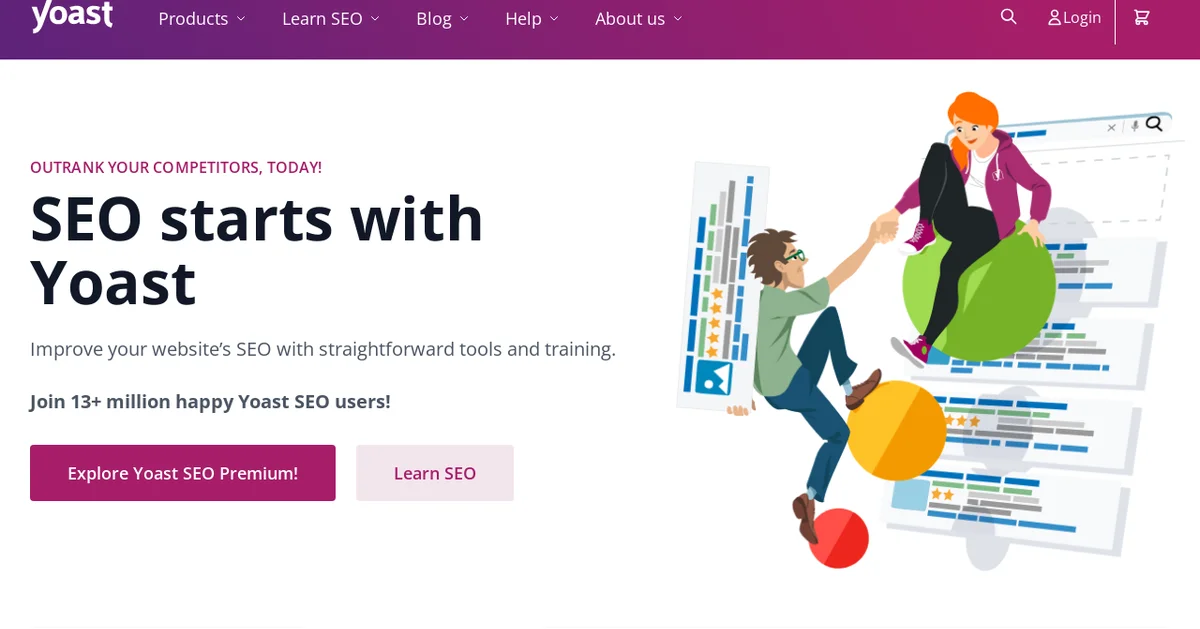
Yoast stands out as a cornerstone SEO tool, best known for its robust WordPress plugin that serves over 13 million users worldwide. The platform bridges the gap between complex SEO requirements and practical implementation, making it accessible for businesses at any stage of growth. Their AI-powered title and meta description generator streamlines optimization tasks, reducing the typical headaches associated with crafting effective metadata.
The platform shines in its practical approach to technical SEO elements. Features like automatic redirect handling and smart internal linking recommendations streamline daily optimization tasks. Many website owners find these automated capabilities essential for maintaining site health without spending hours on manual updates. The round-the-clock support team addresses technical issues promptly, proving especially valuable during critical site changes or updates.
Beyond tools and features, Yoast maintains an extensive knowledge base. Their free educational content includes practical courses and weekly optimization tips that break down complex SEO concepts into manageable steps. Small business owners and marketing teams alike benefit from guidance tailored to their specific website goals and industry needs.
While Surfer SEO excels in content optimization and keyword research, Yoast takes a broader view by combining both technical and content-focused SEO elements into one package.
Pros
- Clear, practical insights without the technical jargon
- Time-saving AI tools for metadata creation
- Responsive support team available 24/7
- Rich learning resources for continuous improvement
- Adaptable for different website categories
Cons
- WordPress-specific, not available for other platforms
- Full feature set restricted to premium users
- Less specialized in content optimization than Surfer
Ahrefs
- including nearly half of Fortune 500 companies
- organizations rely on Ahrefs to drive their digital marketing success. Their track record speaks volumes about what this tool can deliver.
The Site Explorer feature stands out by revealing detailed insights about competitor websites. Marketers can analyze backlink profiles, understand traffic patterns, and uncover keyword opportunities their competition might have missed. The Keywords Explorer goes beyond basic search volumes, revealing seasonal trends and content gaps that help shape more effective content strategies.
Behind the scenes, Ahrefs runs on a massive data collection operation. Their web crawler ranks among the most active in the industry, constantly gathering fresh information from across the internet. This commitment to data quality means marketers can trust the metrics and insights they receive to guide important decisions.
Beyond the technical capabilities, Ahrefs fosters a genuine learning environment through its Ahrefs Insider community. SEO professionals share real-world experiences, troubleshooting tips, and success stories. Combined with responsive support staff, this creates an ecosystem where users can grow their expertise while solving immediate challenges.
Ahrefs stands out from tools like Surfer through its focus on competitive intelligence, thorough keyword analysis, and active user community. The platform’s commitment to reliable data and practical insights makes it a solid choice for serious SEO professionals.
Pros
- Deep competitive analysis tools through Site Explorer
- Rich keyword research and tracking features
- Reliable, often updated data
- Active community of SEO professionals
Cons
- Premium pricing structure
- Complex interface requires time to master
Moz
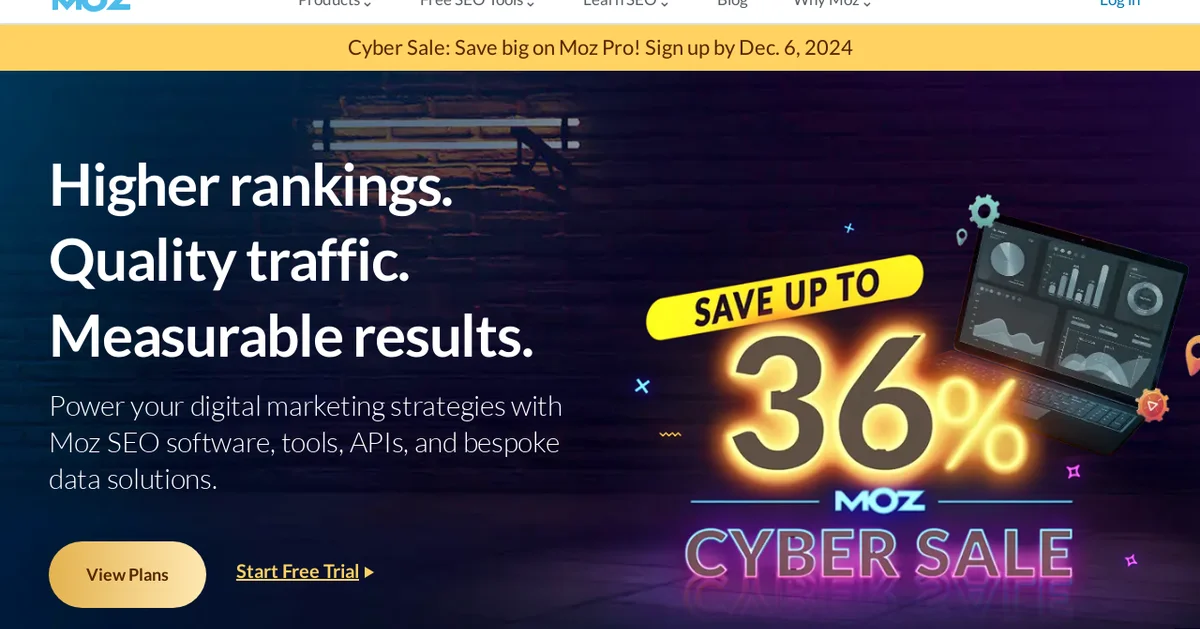
Moz has earned its reputation in SEO circles since 2004, building tools that help businesses boost their search rankings and visibility. Their main product, Moz Pro, handles the core SEO tasks - from finding the right keywords to checking backlinks and running site audits. While competitors like Surfer zero in on content optimization, Moz takes a wider view by including competitive research and local business tools. This broader scope tends to attract marketing teams who need to tackle SEO from multiple angles.
The platform stands out through genuine investment in user education and its active community. Beyond just offering tools, Moz maintains detailed guides, regular webinars, and their widely-read blog that breaks down complex SEO concepts. Marketing teams appreciate the straightforward dashboard design, which makes advanced features accessible without requiring deep technical knowledge. Teams can track rankings, spot website issues, and generate reports that make sense for different stakeholders.
For agencies needing custom data integrations, Moz’s API capabilities enable tailored reporting solutions. Their domain authority metric has become a standard reference point for gauging website credibility.
Moz combines practical tools with educational resources to help teams understand and improve their SEO performance.
Pros
- Full-featured SEO platform covering essential optimization needs
- Rich educational content and active user community
- Clean, intuitive interface that works for different skill levels
- Flexible API for custom reporting needs
- Dedicated local SEO tools through Moz Local
Cons
- Initial learning curve can be steep for newcomers
- More complex feature set compared to focused tools like Surfer
- Premium pricing that smaller companies might find challenging
Page Optimizer Pro
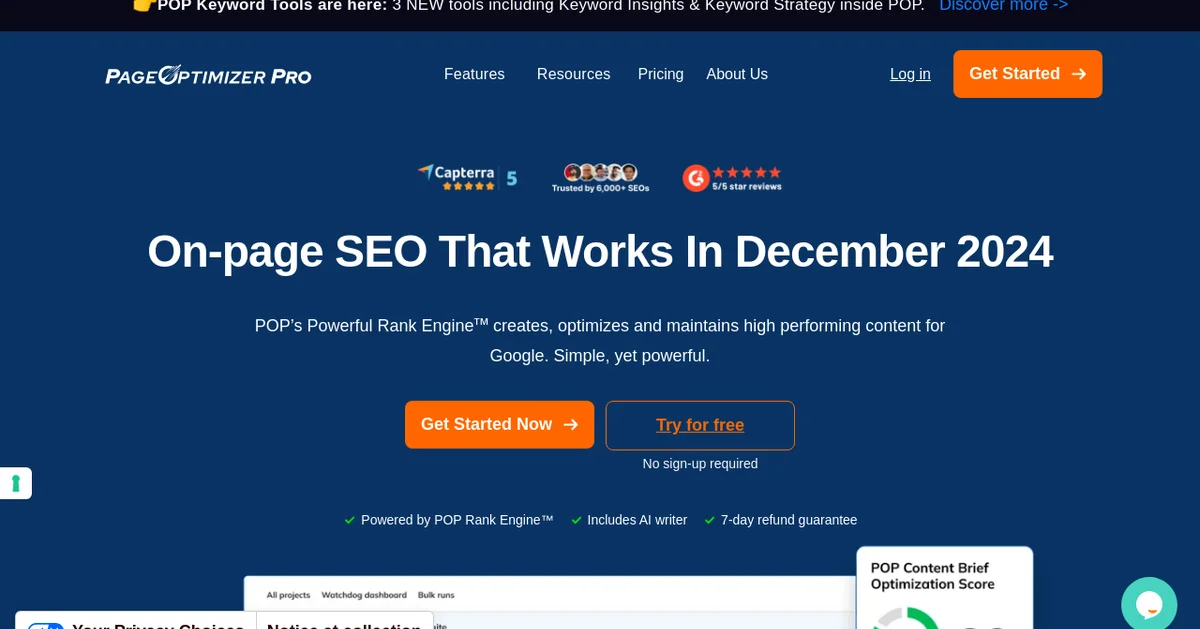
PageOptimizer Pro (POP) stands out from Surfer by taking a data-driven approach to SEO content optimization. The platform’s Rank Engine processes data from hundreds of real-world tests across multiple SEO factors to guide content creation and improvement. Getting started requires just a brief questionnaire, making it straightforward to optimize both existing pages and new content projects.
The built-in AI Writer functionality takes content optimization further by analyzing competitor content while giving users full editorial control. Many agencies report climbing search rankings and increased qualified lead generation after implementing POP’s recommendations. The platform helps maintain an edge in competitive markets by combining AI assistance with human oversight.
A key strength of POP lies in its Nextgen EEAT analysis, which evaluates content against over 100 signals related to expertise and authority. This thorough assessment of content quality and credibility sets it apart from basic optimization tools. The platform also connects seamlessly with Google Docs and popular website builders to streamline the content workflow.
Pros
- Comprehensive Rank Engine backed by extensive testing data
- AI Writer enables strategic competitor content analysis
- Deep EEAT signal evaluation improves content authority
- Proven optimization framework for search visibility
- Flexible integration with common content tools
Cons
- Initial platform navigation takes time to master
- Less name recognition than established competitors
- Feature depth can be daunting for beginners
SE Ranking
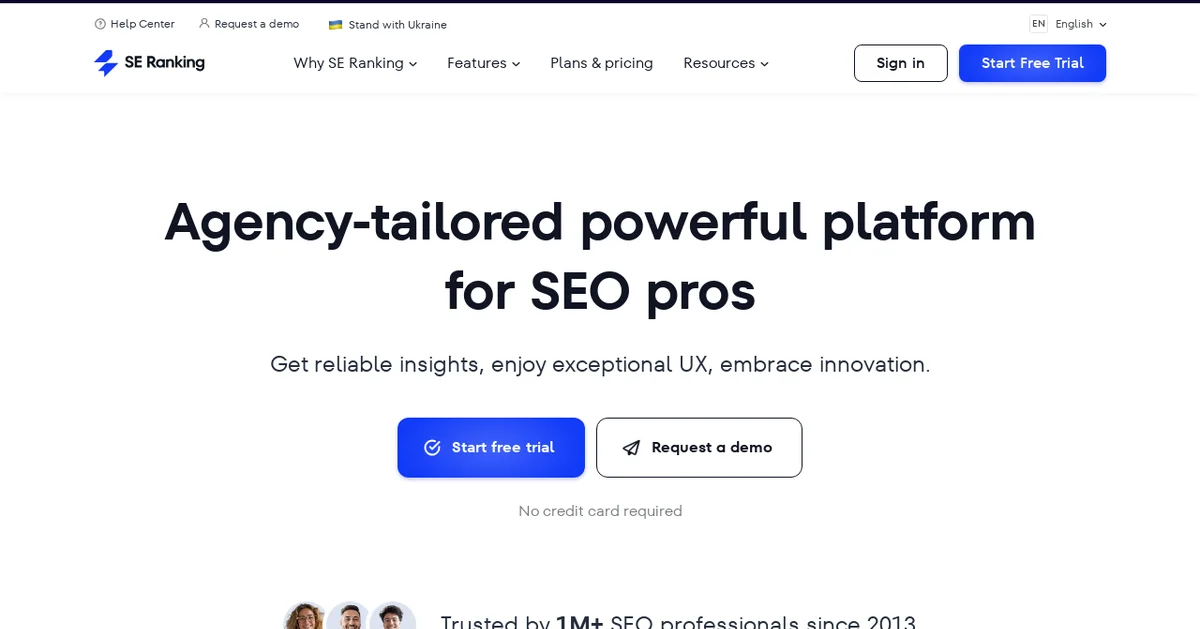
SE Ranking has emerged as a robust SEO platform since 2013, building a solid reputation among marketing agencies and SEO professionals. With a growing base of users spanning 150 countries, the platform combines essential tools like keyword research, SERP analysis, backlink monitoring, and site auditing into one cohesive dashboard. Marketing teams particularly value having these core functions accessible from a central location, which saves considerable time during campaign execution.
The platform’s development path stands out through its responsive approach to user needs. By converting complex SEO data into clear, actionable recommendations, SE Ranking helps agencies develop effective strategies without getting bogged down in technical details. Many marketing professionals have found it offers capabilities that match or exceed those of Surfer SEO, making it a compelling alternative for serious optimization work.
White-label reporting capabilities add significant value for agencies managing multiple client relationships. Teams can present professional, branded reports while maintaining consistent messaging. The platform also excels in local SEO tools, providing granular insights for businesses targeting specific geographic markets - an essential feature often lacking in comparable solutions.
SE Ranking’s flexible pricing structure accommodates different business sizes and needs, while maintaining an approachable interface that balances functionality with ease of use.
Pros
- Full suite of integrated SEO tools
- Regular updates based on user feedback
- Professional white-label reporting
- Scalable pricing options
- Comprehensive local SEO capabilities
Cons
- Some advanced features found in alternatives not available
- Initial platform navigation takes time to master
Content Harmony
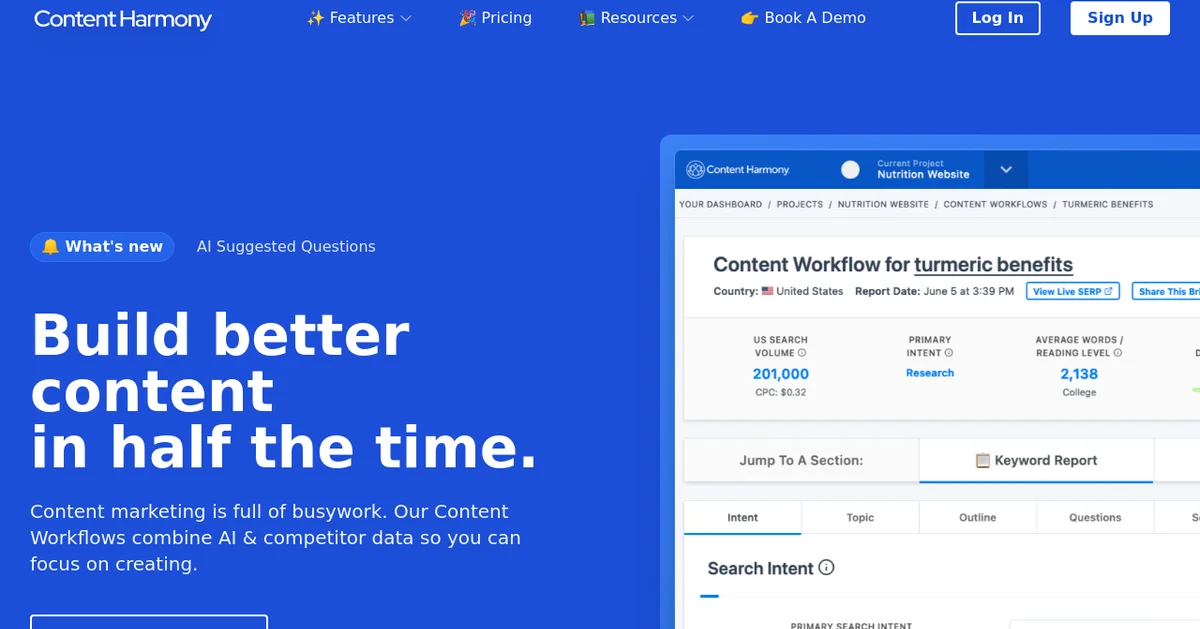
Content Harmony emerged from the real-world challenges faced by SEO content teams. Built by content marketing veterans who’ve worked in the trenches since 2012, this tool addresses common workflow bottlenecks that slow down content production. Their hands-on experience with client projects helped shape practical features that solve day-to-day content creation hurdles.
The platform takes a pragmatic approach to content optimization. Rather than overwhelming users with endless data points, it combines AI analysis with competitor research to accelerate content development. Teams can quickly assess search intent patterns and spot content gaps. The outline generator pulls in relevant questions and subtopics, cutting research time significantly while ensuring comprehensive coverage of each topic.
Content teams particularly benefit from the standardized briefing system. Writers, editors and designers can access consistent project requirements through shareable templates. The AI-powered grading feature measures draft quality against topic models built from top-performing content, helping maintain high standards across all deliverables.
Content Harmony serves as a practical alternative to Surfer, with tools that emphasize efficient collaboration and faster content production cycles.
Pros
- Streamlined keyword research workflow
- AI content quality scoring
- Standardized brief templates for team use
- Built on practical content marketing experience
Cons
- Missing some specialized features found elsewhere
- Initial platform learning takes adjustment
Ryte
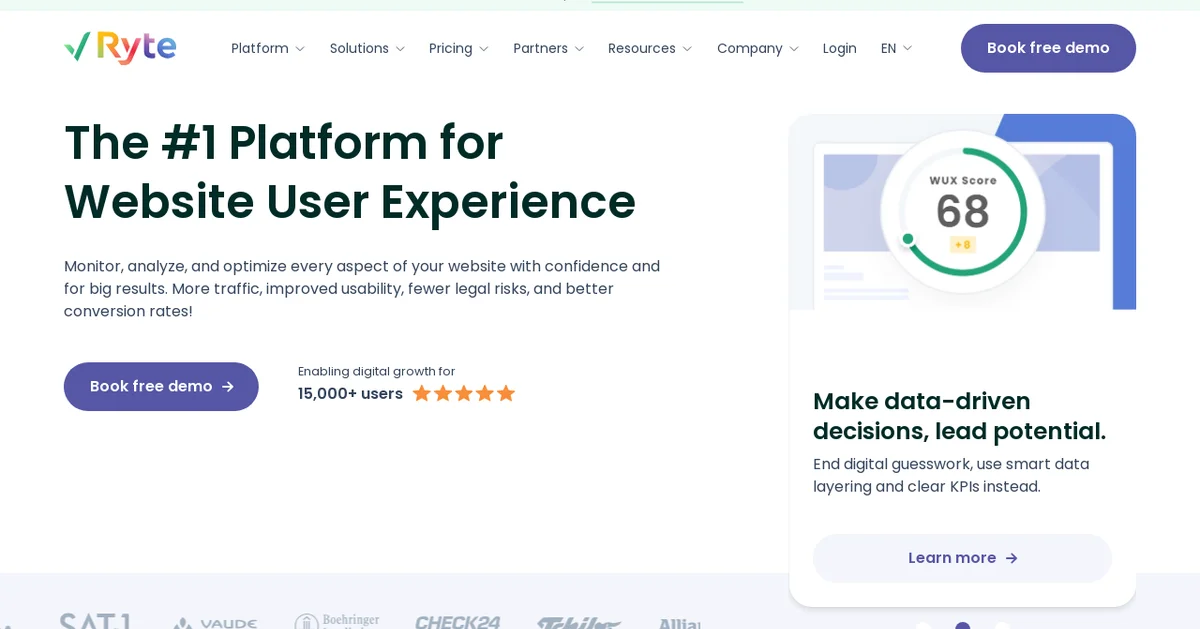
Ryte has carved out a unique position in website optimization by combining technical SEO with user experience elements. The platform now serves a diverse client base of 15,000 users, including major enterprises like Boehringer Ingelheim. Their approach centers on measurable results and practical improvements that boost organic traffic through better site performance.
The platform’s Website User Experience (WUX) framework stands out from typical SEO tools. Built around seven core optimization pillars, WUX tackles everything from site speed to accessibility and regulatory compliance. Real-world results show websites using Ryte’s optimization methods see average session duration increases of 40%. This broader scope offers more depth than Surfer’s primarily content-focused toolset.
Technical SEO becomes more approachable through Ryte’s automated error detection and fix recommendations. Marketing teams can spot and resolve issues without deep technical expertise, leading to faster improvements and better results. The platform also factors in environmental impact by helping teams build more energy-efficient websites - an emerging priority for many brands.
Ryte fills a specific need for organizations that want comprehensive website optimization beyond basic SEO metrics. Their structured approach to improving both technical performance and user experience helps marketing teams tackle complex optimization challenges systematically.
Pros
- Deep integration of user experience metrics
- Practical recommendations for technical fixes
- Built-in sustainability and compliance tools
- Clear data visualization for decision-making
Cons
- Feature complexity requires learning curve
- May exceed needs of smaller organizations
- Limited keyword optimization tools compared to Surfer
TextMetrics
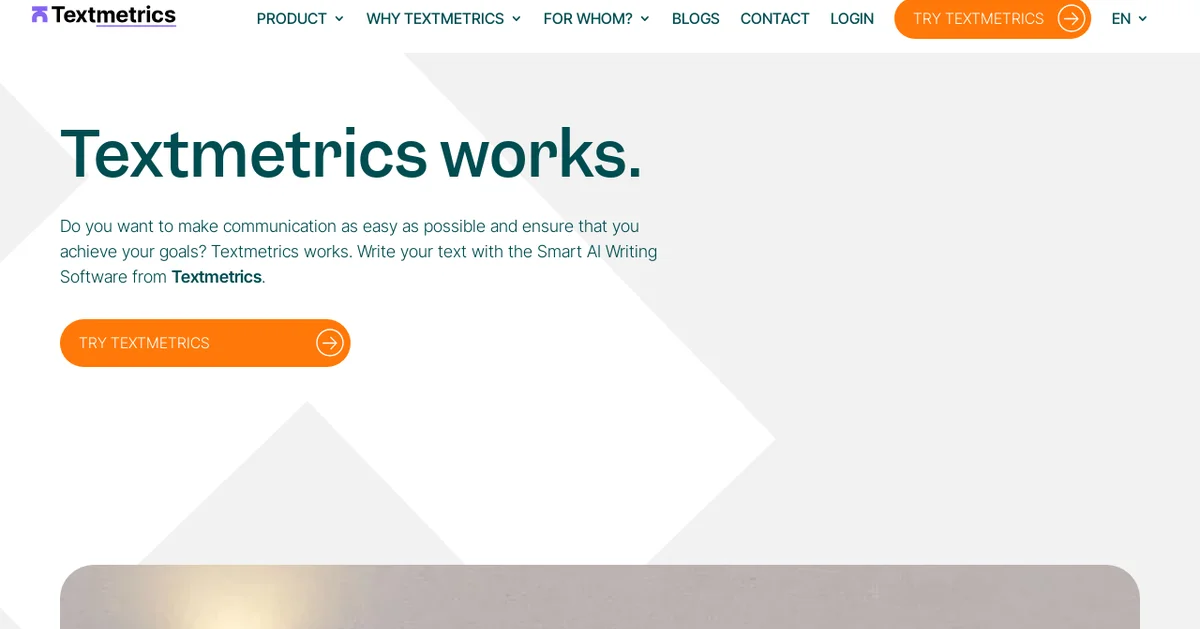
Textmetrics stands out as a comprehensive writing platform that enhances communication across organizations. Going beyond basic grammar correction, it helps teams align their writing with established corporate guidelines through real-time feedback. While tools like Surfer zero in on SEO keywords, Textmetrics takes a broader approach by monitoring content for inclusion standards, brand voice consistency, and potential bias - making it valuable for businesses that prioritize cohesive messaging and diverse communication.
A key strength of the platform lies in its large-scale text analysis capabilities. Companies can scan entire document libraries to spot any deviations from corporate standards. This level of oversight proves particularly valuable in sectors where precise communication matters most. The platform’s central dashboard gives management teams clear visibility into content performance and alignment with company values.
Beyond just enforcing guidelines, Textmetrics works to improve overall writing quality. The tool evaluates factors like sentence structure, word choice complexity, and passive voice usage. Many organizations have seen tangible results from this focus on clarity - from improved reader engagement to more diverse candidate pools responding to job postings.
Looking at the complete picture, Textmetrics delivers robust writing support and corporate compliance features that set it apart from pure SEO tools like Surfer.
Pros
- Smart writing suggestions in real-time
- Strong corporate guideline monitoring
- Unified management dashboard
- Built-in inclusivity and readability tools
Cons
- Limited SEO optimization features
- Learning curve for Surfer users
BrightEdge
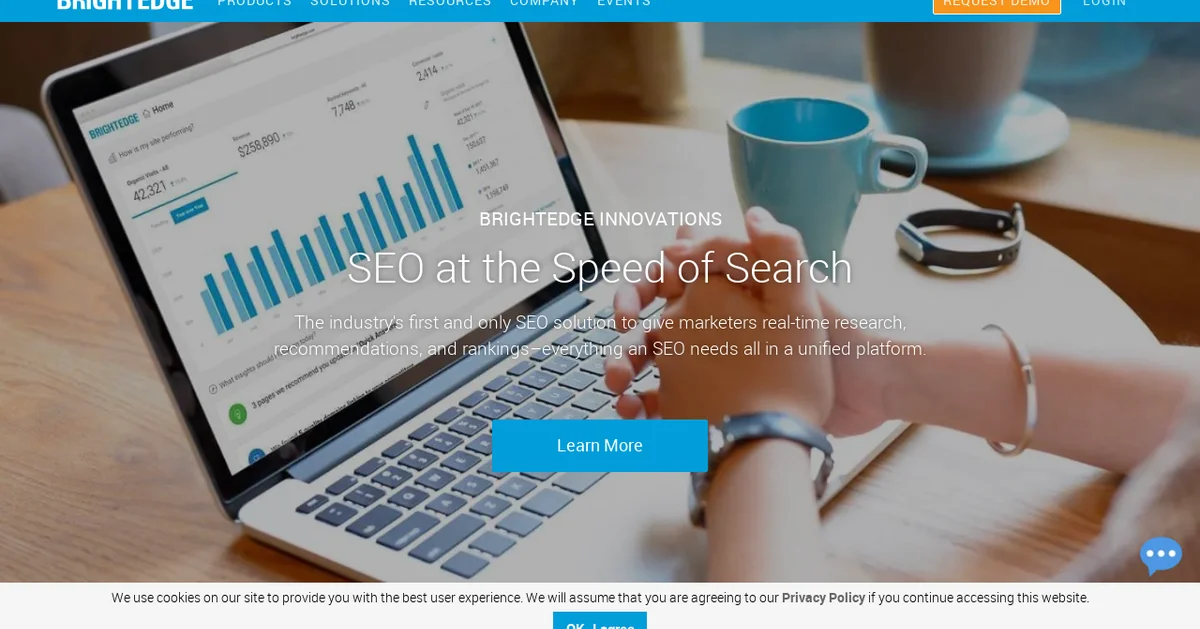
BrightEdge delivers enterprise-level SEO and content optimization through a unified platform that tracks research, recommendations, and rankings. Their customer base spans 1,700+ organizations, with tools designed to map customer journeys and search behavior. The platform excels at decoding search intent, giving businesses practical insights into customer needs while staying ahead of market shifts.
What makes BrightEdge notable is their emphasis on forecasting business outcomes and smart prioritization of SEO tasks. While Surfer zeroes in on content optimization, BrightEdge takes a broader view by merging data analysis with strategic planning for content development and performance tracking. Marketing teams can see how recommended changes could impact revenue goals. The system monitors key metrics while providing valuable market context.
BrightEdge developed their platform to cut through SEO complexity for digital marketing teams. Their approach generates clear, practical insights that connect online strategies with business results. The platform handles everything from content refinement to social campaign optimization, serving as a central hub for teams focused on boosting visibility and engagement.
BrightEdge stands out as a robust alternative to Surfer by connecting SEO tactics to broader marketing strategy.
Pros
- Real-time data and recommendations
- Comprehensive insights into search intent
- Effective content monitoring
- Strong focus on predicting business impact
Cons
- May have a steeper learning curve
- Pricing may be higher than some alternatives
- More complex interface than simpler tools
Outranking
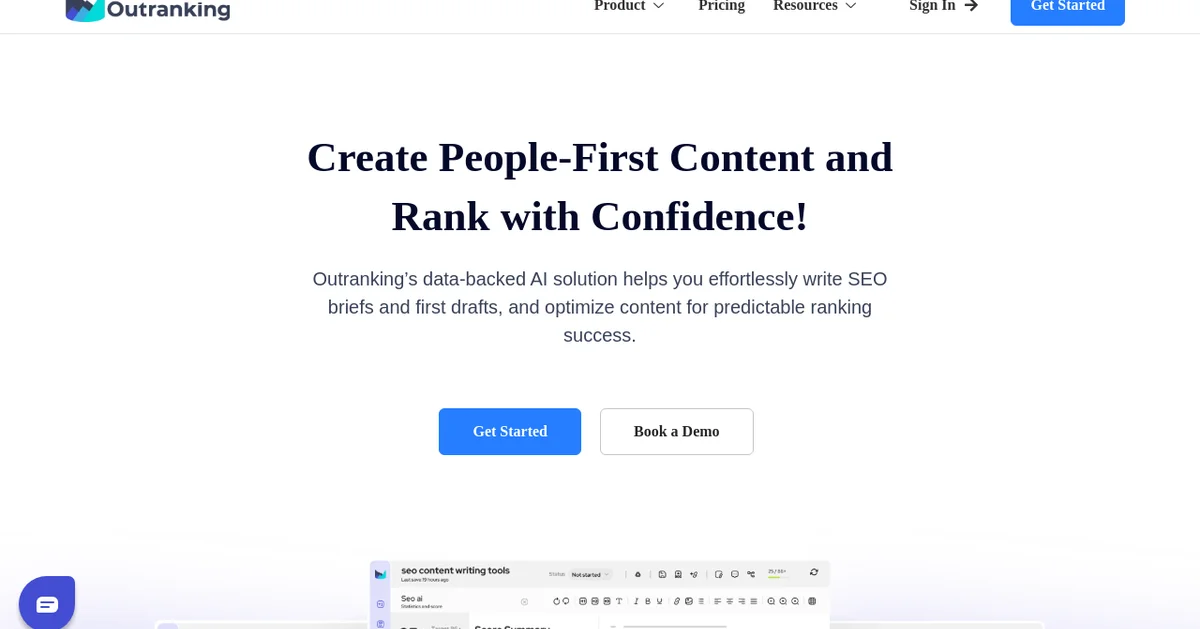
Outranking has emerged as a compelling alternative to Surfer in the SEO content optimization space. The platform takes a fresh approach by emphasizing human-centric content while maintaining solid SEO fundamentals. This balance sets it apart from conventional tools that get caught up in keyword metrics and ranking numbers.
The platform’s AI content generation stands out from the crowd. Rather than churning out generic copy, it analyzes SERP data to shape content direction and help writers produce genuinely useful articles. Through its “Concepts” feature, teams can leverage this data to develop distinctive content that connects with readers - moving beyond the cookie-cutter output typical of many AI writing tools.
The built-in SEO content checker and optimization system delivers real value. By automatically auditing content against current SEO standards and providing instant page quality feedback, it tackles a major challenge for content teams. Marketing professionals can maintain optimized, current content across their sites without getting bogged down in manual updates.
Team collaboration gets a significant boost with Outranking’s workflow features. The platform streamlines content production through smart task management and team coordination tools. This practical approach helps agencies and marketing departments hit their content targets while maintaining high standards.
Outranking effectively connects the dots between content development and search optimization. The combination of user-focused content tools, practical features, and an accessible interface makes it a strong contender in the space.
Pros
- Smart AI content creation with SEO focus
- Strategic SERP data integration
- Thorough content audit and optimization
- Improved team collaboration tools
Cons
- Initial platform learning takes time
- Select features less developed than specialists
CanIRank
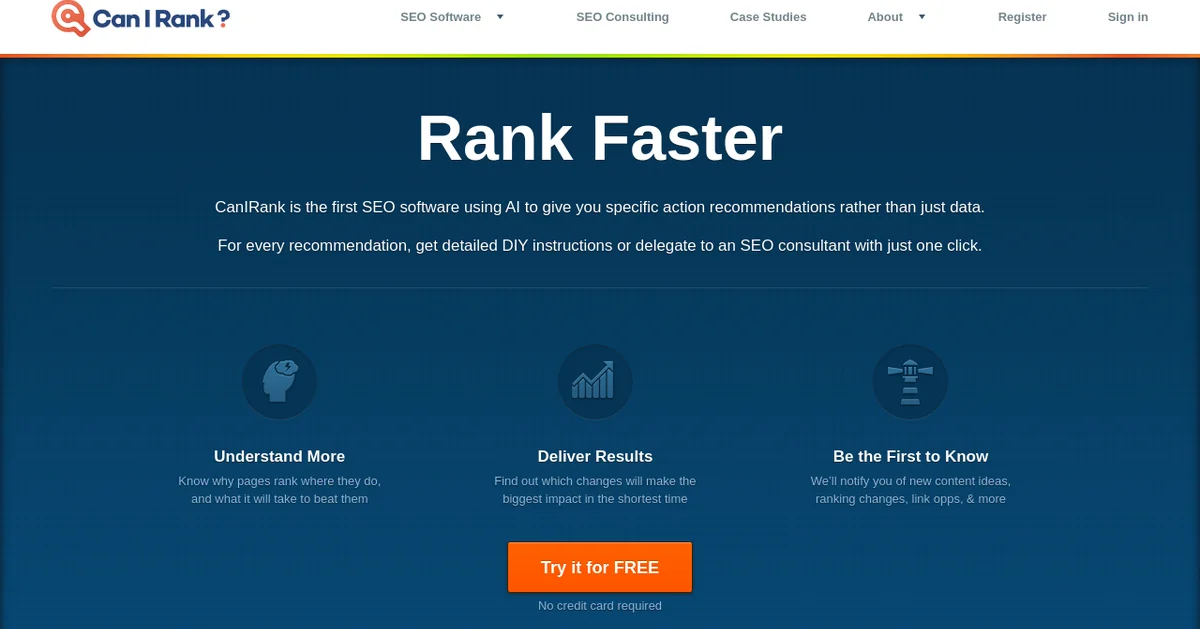
CanIRank stands out in the crowded SEO software market by taking a more practical approach to website optimization. Rather than drowning users in data points, this tool cuts through the noise with straightforward recommendations that businesses can act on right away.
The platform’s AI technology serves as a digital SEO consultant, breaking down complex optimization tasks into manageable steps. Small business owners and marketing teams can either handle these tasks internally or hand them off to contractors with clear instructions - particularly valuable for organizations just starting to build their SEO capabilities.
One standout element is the Ranking Probability tool, which has proven significantly more accurate than conventional keyword difficulty metrics. When paired with their ROI scoring system, this feature helps pinpoint keywords that deliver actual business value. The automated research functions streamline what would typically be hours of manual analysis.
The system also keeps tabs on ranking fluctuations and competitive movements, flagging important shifts that require attention. This proactive monitoring helps marketing teams stay ahead of market changes.
For businesses seeking clear direction rather than endless analytics, CanIRank delivers practical value through its guided approach to SEO improvement.
Pros
- Actionable AI recommendations
- Clear implementation guidelines
- Superior keyword difficulty predictions
- Streamlined research capabilities
- Real-time competitive monitoring
Cons
- Limited advanced analytics features
- Self-service focus may not suit larger enterprises
Ink Editor
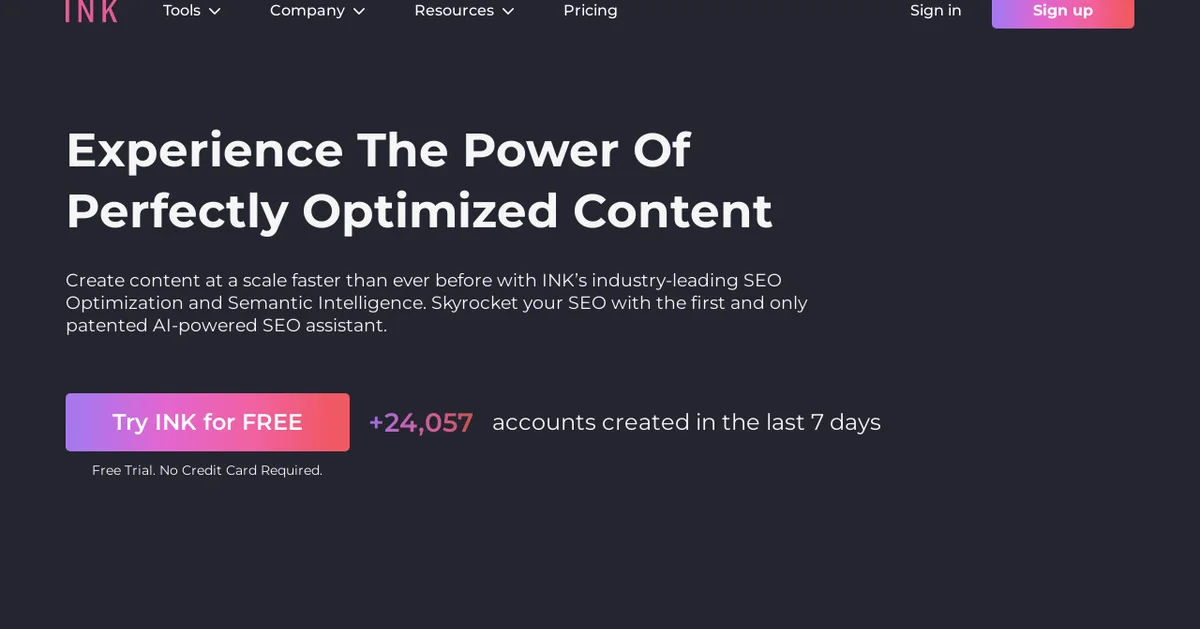
Ink Editor provides a fresh take on SEO content optimization, offering features that set it apart from Surfer. The platform combines practical SEO tools with AI-powered content creation capabilities, making it particularly effective for teams needing to produce optimized content efficiently.
- a patented AI SEO assistant
- goes beyond basic optimization by incorporating real-time audience data into the writing process. Through semantic intelligence, content creators can better match their work to actual search intent, boosting both engagement metrics and search result placement.
Companies often struggle with juggling multiple content marketing tools, which makes Ink Editor’s consolidated approach appealing. The platform’s ability to accelerate content creation tenfold helps marketing teams maintain momentum without sacrificing quality. This speed advantage allows more time for developing strategic initiatives rather than getting stuck in content production.
Beyond the technical features, Ink Editor maintains an active learning environment through its educational resources. The platform offers practical courses and maintains an engaged user community, reducing dependence on external SEO consultants while building internal expertise.
Ink Editor delivers solid value for organizations prioritizing streamlined content optimization workflows and comprehensive marketing capabilities.
Pros
- Advanced AI-powered SEO assistance
- Dynamic audience insight integration
- Full-featured content marketing suite
- Strong educational resources and community
Cons
- Less robust keyword analysis compared to Surfer
- Notable learning curve for full platform mastery
- Basic technical SEO functionality
GrowthBar
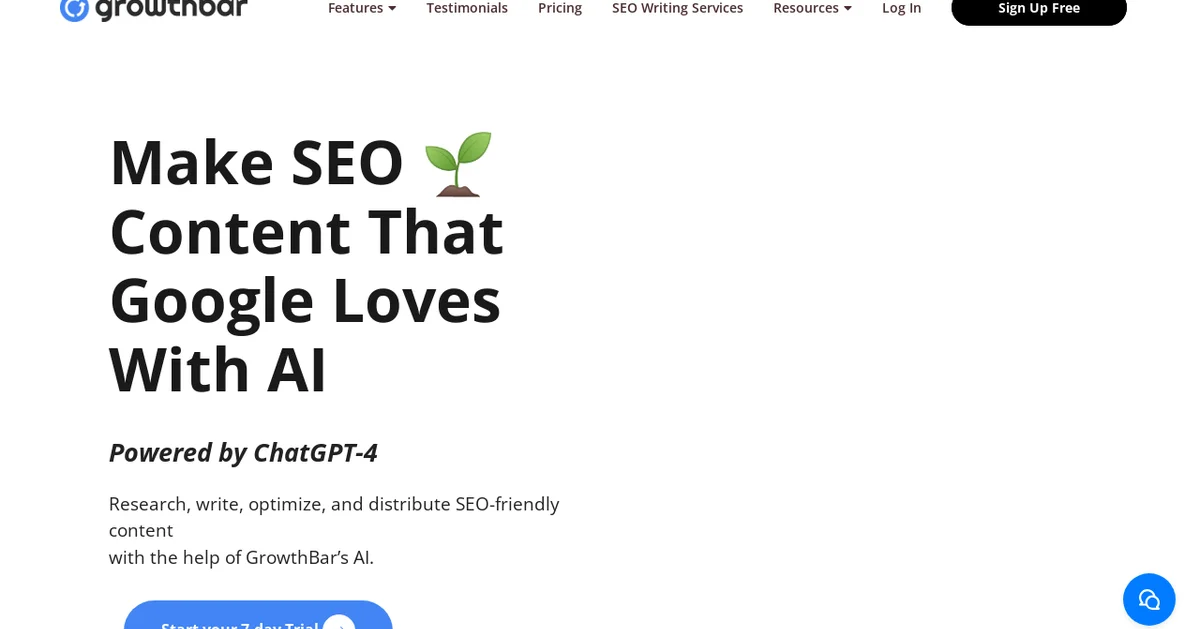
GrowthBar stands out among SEO writing tools by streamlining content production while keeping quality high. Marketing teams and content creators benefit from its AI capabilities without getting bogged down in complexity. The Content AI feature transforms search results into ready-to-use outlines, complete with relevant headings and keywords - saving hours of manual research and planning.
The platform’s 2-Minute Blog Builder transforms content creation from a day-long task into something achievable during a coffee break. Teams can generate full 1,500-word blog posts that follow SEO guidelines without sacrificing quality. Beyond just writing, GrowthBar provides robust keyword research capabilities, showing difficulty scores and potential revenue metrics that help shape effective content strategies.
Marketing teams appreciate GrowthBar’s straightforward design that works for everyone from interns to seasoned content directors. The tool learns from existing content to create custom AI models, preserving each brand’s distinct writing style. A Chrome extension and additional AI writing features make it practical for various marketing tasks.
GrowthBar delivers efficient content creation without compromising search optimization. Companies seeking an alternative to Surfer will find its speed and team features particularly valuable.
Pros
- Rapid creation of SEO-ready content
- Simple interface that works for all experience levels
- Brand voice preservation through custom AI
- Deep keyword research capabilities
- Built for team collaboration
Cons
- Some advanced features missing compared to alternatives
- Initial adjustment period with AI tools
- AI assistance might reduce content authenticity